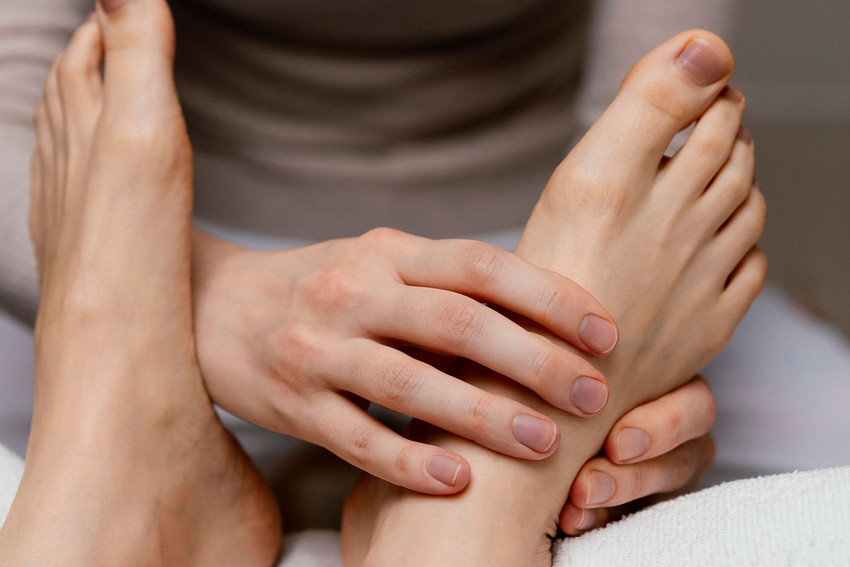Ease Your Steps: How to Stop Neuropathy in Feet Today
Posted by EcoSox on Feb 29th 2024
Ease Your Steps: How to Stop Neuropathy in Feet Today
Understanding how to stop neuropathy in feet is crucial for anyone looking to prevent the discomfort and severe complications associated with this condition.
Peripheral neuropathy, if left unaddressed, might result in foot ulcers that, when infected, can escalate to gangrene or tissue death. This could, in the most severe scenarios, necessitate amputation of the affected foot to prevent further damage.
In this blog, we’ll talk more about this condition and why it’s necessary to get treatment immediately.
Understanding Neuropathy in Feet: Recognizing the Signs
Neuropathy in the feet occurs when the peripheral nerves, the network of nerves outside your brain and spinal cord, are damaged. These nerves send signals between your brain, spinal cord, and the rest of your body, including your feet.
When these nerves are damaged, it disrupts their ability to communicate effectively, leading to various symptoms in the feet.
The damage to the nerves can result from diabetes, injuries, infections, and exposure to toxins. Sometimes, the exact cause is unknown, making it even more dangerous for anyone’s overall health.
Signs You Might Have Neuropathy in Feet
- Tingling Sensations: One of the earliest signs of neuropathy is a tingling or prickling sensation in your feet, often described as the feeling of "pins and needles."
- Numbness: Over time, you might notice numbness in your feet, making it hard to feel sensations like temperature or pain. This can be particularly dangerous as it increases the risk of injuries going unnoticed.
- Pain: Sharp, throbbing, or burning pain in the feet is a common sign of neuropathy. This pain can vary in intensity and may worsen at night.
- Weakness: A feeling of weakness or instability in your feet can occur, making it difficult to walk or perform tasks that require precise foot movements.
- Loss of Balance: Neuropathy can affect your ability to sense the position of your feet, leading to challenges with balance and coordination.
- Changes in Foot Shape: In some cases, neuropathy can lead to changes in the shape of your feet due to weakened muscles.
- Skin Changes: Look out for changes in the skin on your feet, such as dryness or a loss of hair, which can indicate nerve damage.
Recognizing these signs early on is vital to understanding how to stop neuropathy in feet. If you notice any of these symptoms, immediately consult a healthcare professional.
How To Stop Neuropathy in Feet: Best Treatments
Managing and stopping the progression of neuropathy in your feet involves a combination of medical treatments, lifestyle adjustments, and home remedies. Let's explore how to stop neuropathy in feet.
Control Underlying Conditions
The first step in understanding how to stop neuropathy in feet is to manage any underlying health issues that may be contributing to nerve damage. For instance, if diabetes is the cause, keep your blood sugar levels under control through diet, exercise, and medication. This can significantly reduce the progression of neuropathy and relieve symptoms.
Medications
Several types of medications can help relieve the pain and discomfort caused by neuropathy. These include:
- Pain Relievers: Over-the-counter pain medications can alleviate mild symptoms, while more severe pain might require prescription-strength painkillers.
- Anticonvulsants: Originally developed to control seizures, these drugs can also help manage nerve pain.
- Antidepressants: Certain antidepressants have been found effective in relieving pain by interfering with chemical processes in your brain and spinal cord that cause you to feel pain.
Physical Therapy
Physical therapy can be beneficial for people with neuropathy in their feet. It can help improve mobility, strengthen muscles, reduce pain, and prevent muscle cramps and spasms. A physical therapist can tailor exercises to your specific needs, helping to maintain balance and prevent falls.
Healthy Lifestyle Choices
Adopting healthy lifestyle habits includes maintaining a balanced diet rich in vitamins and nutrients, exercising regularly to improve circulation, and avoiding factors that can worsen neuropathy, such as smoking and excessive alcohol consumption.
Wearing Compression Socks
Wearing compression socks is another effective strategy to help manage neuropathy in the feet. These socks apply gentle pressure to your legs and feet. The benefits of compression socks include:
- Enhanced Circulation: Improved blood flow helps nourish damaged nerves, potentially slowing the progression of neuropathy.
- Reduced Swelling: Compression socks can minimize edema (swelling) in the feet and ankles, alleviating pain and discomfort.
- Pain Relief: By improving circulation and reducing swelling, compression socks can help lessen the pain associated with neuropathy.
- Prevention of Further Complications: Enhanced blood flow can also prevent potential complications like ulcers and infections, particularly important for individuals with diabetes.
Incorporating these treatments into your care plan can significantly improve your symptoms of neuropathy in the feet. Always consult with a healthcare provider before starting any new treatment.
Bamboo Viscose Compression Socks: Ultimate Support for Neuropathy Relief
If you're searching for effective ways how to stop neuropathy in feet, consider wearing proper footwear and support. EcoSox offers a solution that goes beyond ordinary socks - introducing our bamboo compression socks.
With mild compression, these socks help manage symptoms of neuropathy by enhancing circulation and reducing swelling. It also combats leg fatigue and swelling, crafted for those who spend long hours on their feet or seated.
Made from viscose fibers sourced from eco-friendly and sustainable bamboo, our socks are as soft as silk and incredibly absorbent, ensuring your feet stay dry, comfortable, and odor-free.
Don't let neuropathy control your life. Choose EcoSox and take a step towards comfort, relief, and better foot health.

